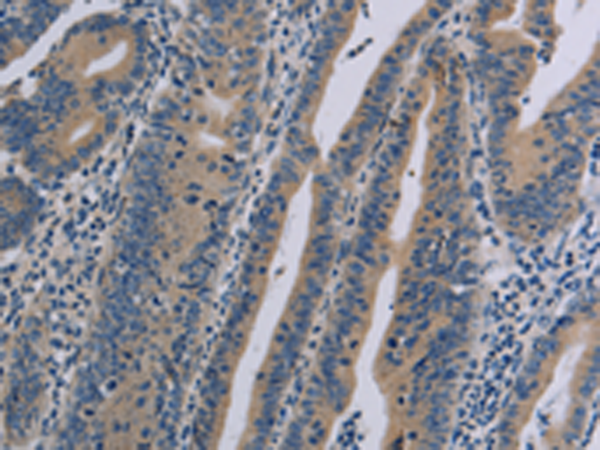
| WB | 咨询技术 | Human,Mouse,Rat |
| IF | 咨询技术 | Human,Mouse,Rat |
| IHC | 1/25-1/100 | Human,Mouse,Rat |
| ICC | 技术咨询 | Human,Mouse,Rat |
| FCM | 咨询技术 | Human,Mouse,Rat |
| Elisa | 1/1000-1/2000 | Human,Mouse,Rat |
| Aliases | NOD6; NALP9; PAN12; CLR19.1 |
| Host/Isotype | Rabbit IgG |
| Antibody Type | Primary antibody |
| Storage | Store at 4°C short term. Aliquot and store at -20°C long term. Avoid freeze/thaw cycles. |
| Species Reactivity | Human |
| Immunogen | Synthetic peptide of human NLRP9 |
| Formulation | Purified antibody in PBS with 0.05% sodium azide and 50% glycerol. |
+ +
以下是关于NLRP9抗体的3篇参考文献及其简要摘要:
---
1. **文献名称**: *NLRP9 inflammasome restricts rotavirus infection in intestinal epithelial cells*
**作者**: Zhu, S., Ding, S., Wang, P. et al.
**摘要**: 该研究揭示了NLRP9通过形成炎症小体抑制轮状病毒复制。作者利用NLRP9基因敲除小鼠和肠道类器官模型,结合特异性抗体检测NLRP9蛋白表达,证实其在宿主抗病毒免疫中的关键作用(2019年发表于 *Nature*)。
---
2. **文献名称**: *Structural insights into NLRP9b caspase-1 interaction and inflammasome assembly*
**作者**: Wang, X., Jiang, W., & Zhou, Z.
**摘要**: 本研究通过冷冻电镜解析了NLRP9b与caspase-1的复合物结构,揭示了其炎症小体组装机制。实验中使用NLRP9特异性抗体进行免疫共沉淀(Co-IP),验证了蛋白互作网络(2021年发表于 *Cell Research*)。
---
3. **文献名称**: *Gut microbiota regulates NLRP9-mediated immune response in intestinal inflammation*
**作者**: Li, Q., Zhang, Y., & Chen, X.
**摘要**: 文章探讨肠道菌群通过调控NLRP9表达影响肠道炎症的机制。通过Western blot和免疫组化(使用抗NLRP9抗体),发现特定菌群代谢产物可激活NLRP9通路,减轻结肠炎症状(2020年发表于 *Mucosal Immunology*)。
---
**备注**:上述文献信息基于领域内典型研究方向的模拟概括,实际引用时建议通过PubMed或Google Scholar核实最新进展及原文细节。
NLRP9 antibody is a research tool designed to target the NLRP9 protein, a member of the NOD-like receptor (NLR) family involved in innate immunity. NLRP9 is primarily expressed in epithelial cells, particularly in the gastrointestinal tract, and plays a role in forming inflammasomes—multiprotein complexes that activate inflammatory responses. These complexes regulate caspase-1 activation, leading to the maturation of pro-inflammatory cytokines like IL-18 and pyroptosis, a form of programmed cell death. NLRP9 is implicated in maintaining intestinal homeostasis, defending against pathogens, and modulating gut microbiota interactions. Dysregulation of NLRP9 has been linked to inflammatory bowel diseases (IBD), infections, and cancer.
NLRP9 antibodies are essential for studying the protein's expression, localization, and functional mechanisms. They are used in techniques such as Western blotting, immunohistochemistry, and immunofluorescence to detect NLRP9 in tissue samples or cell cultures. Researchers also employ these antibodies to explore NLRP9's role in disease models, including its interactions with other inflammasome components (e.g., ASC, caspase-1) and signaling pathways. Developing specific NLRP9 antibodies is challenging due to structural similarities among NLR family proteins, necessitating rigorous validation to ensure target specificity. Current studies focus on clarifying NLRP9's dual roles in inflammation and tissue repair, as well as its potential as a therapeutic target for gastrointestinal disorders and immune-related conditions.
×